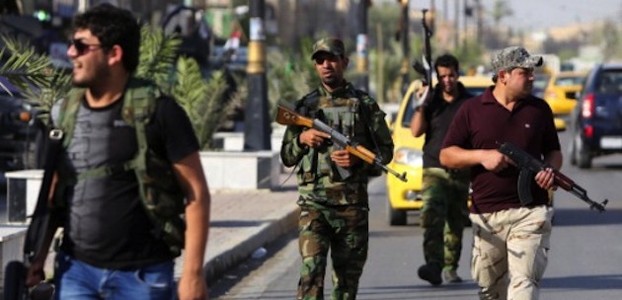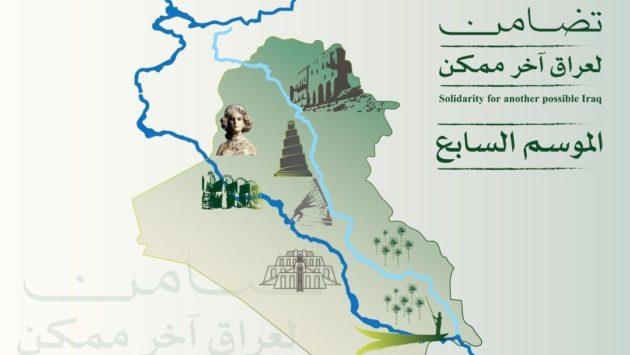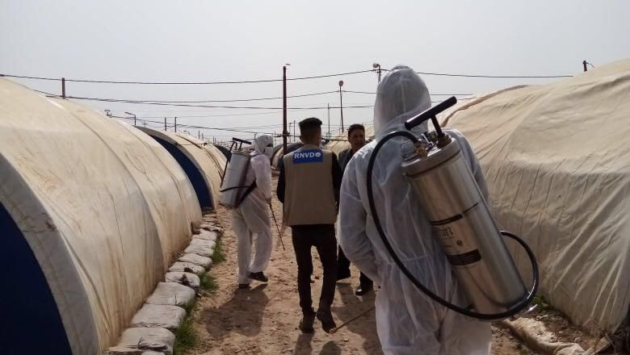Iraq’s New Law on Political Parties And Militias Unlikely to Succeed
Iraq’s new political parties law tries to separate political entities from their affiliated militias. But, as many local analysts argue, it’s an impossible task; the legislation flies in the face of reality.
On August 27, the Iraqi Parliament approved a long-awaited and much-debated draft law on political parties in the country. While some aspects of political parties in Iraq are still not regulated and some of the problems not addressed – for example, sources of funding, internal structure, party ownership of property or media houses – there was what many regarded as a positive step.
One of the stipulations in the new law prohibits Iraqi political parties from having any kind of military wing and even from being linked or affiliated to any military factions. But its highly likely that this law, despite its positive reception, is going to be one of those pieces of Iraqi legislation that everyone ignores because it has very little to do with the current situation on the ground.
Most Iraqi political parties are associated with, or officially have, a militarised aspect. For example, the Sadrist movement – led by the cleric Muqtada al-Sadr – has both a political wing, the Ahrar party, and a military wing, the Peace Brigades and a larger, though currently disbanded group, the Mahdi Army. Most other political parties in Iraq are similar. If they don’t have direct links to a militia, they are certainly associated with one.
Although numbers change as groups evolve and devolve, the most recent estimate suggests there are about 42 different armed militias active in the country. And during the current security crisis, which was sparked by the extremist group known as the Islamic State in the middle of last year, these unofficial military groups have played an important part, spearheading the fight against the Islamic State group when the Iraqi army appeared unable to do so.
Currently the militias, made up of mostly Shiite Muslim volunteers, are supposed to be associated with a government commission which helps fund and supposedly organise them.
One law that could better regulate the militias’ movements and behaviour is the proposed National Guard law. That law would effectively allow local people to form their own military units and police their own areas; it was considered an antidote for the marginalization of Iraq’s Sunnis and Kurds. However Iraqi politicians cannot appear to get this through Parliament, with some saying that separate forces throughout the country are a threat to national unity. This is even though a National Guard law could also be a solution for the unofficial militias, allowing their presence but regulating it, and putting them into another category altogether.
Some have suggested that another law – some sort of third piece of legislation that isn’t the National Guard law or the political parties law – should be formulated.
“These militias are associated with the government right now because Iraq is virtually at war,” notes senior Shiite Muslim MP, Sami al-Askari. “But in the future these militias should be integrated into the official Iraqi army. There are some MPs who believe a special law should be enacted just for the militias, that would give them the right to exist. It should put the militias under the control of the state and at the same time, cause them to disconnect any links they have with the political parties that first started them.”
It sounds like a good idea that would solve several problems but there is a big issue with it. Many of the militia members currently carrying guns and fighting the Islamic State, or IS, group, are often also already members of the parties that the armed wing is affiliated with. In fact some of the militias started life as political parties and have only recently evolved into fighting groups.
“Is it possible for a political party that has 5,000 fighters to let go of those fighters, to send them to become members of a state-run force and to ban them from joining its ranks?” asks Amir al-Waeli, a local man and former police officer. “It would be such a big loss of membership that no political party would tolerate that,” he says, answering his own question.
Al-Waeli believes that even if the new law is implemented and members of any and all security forces disconnect from their political parties, there will still be problems. “If they’re not convinced of their work for the government, the members of the militias will still be loyal to their parties,” he argues before concluding that he doesn’t think the militias and the political parties can ever be separated, due to the circumstances in which they were created.
There are also fears that, no matter what happens, politicians will find a way to manipulate this law, as they have done many others. “It may mean the end of some political parties,” suggests senior military man, Abdul-Karim Khalaf, also a former spokesman for Iraq’s Ministry of the Interior. “They wouldn’t be able to exist.”
“The law will sideline a large section of Iraqi society – it could be used against anyone who was a former member of [Saddam Hussein’s outlawed political party] the Baath party,” Khalaf told NIQASH; this would apply to a lot of Sunni Muslims in Iraq. “And all of the other parts of the legislation, involving funding or other aspects, can easily be manipulated. Politicians are good at that,” he says.
And there is also one other very important point to make about the new political parties law. Iraq’s unofficial Shiite Muslim militias are actually becoming stronger at the moment, rather than weaker. It may be better to formulate legislation that takes into account the military nature of Iraqi political parties under the current circumstances and work out how to deal with that reality, rather than proposing, and passing, something that, no matter how worthy the intention, seems unlikely to happen.





